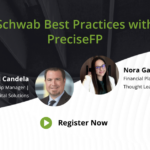Some financial skills are timeless, but others change with the trends and market changes. Financial advisors today likely have a different approach from advisors a few decades ago. What do advisors need to thrive in today’s unique circumstances? Here are 10 skills every modern advisor needs.
Communication
Clients want an advisor they feel comfortable communicating with. Knowing how to communicate well across numerous channels (including in person, on video, in writing, etc.) can help build strong client relationships. Successful advisors know how to explain complex financial concepts easily.
Listening and Empathy
Hand in hand with strong communication skills is the need to be a strong listener and practice empathy. Great advisors know how to ask the right questions and take time to truly listen to their clients and get to know them. As advisors listen, they can develop empathy to better understand their clients. Listening and empathy are foundational to building a trusting advisor relationship.
Technical Skills
We live in a technology-driven world, and advisors must know how to leverage digital tools to serve their clients. Advisors need to know how to use internal tools to manage clients’ accounts, model potential investments, and organize paperwork. They also need to be able to communicate digitally with their clients and connect via client dashboard. If an advisor doesn’t know how to use a digital tool, they at least need to know where to go to learn how.
Personalization
Clients want service and financial recommendations that are tailored to their needs. That means advisors need to know how to understand clients and deliver personalized service. The skill of personalization requires getting to know clients and understanding their lifestyle, financial situation, and future goals. From there, advisors can create personalized plans and deliver them in the way each client prefers — even following up later to check on life events or important moments.
Collaboration
Financial advising isn’t a solo sport. Modern advisors need to be comfortable working with other people. They often have to collaborate with their clients to get on the same page. Advisors also have to collaborate with other advisors at their firms or other professionals. As the demand for comprehensive, holistic advising increases, financial advisors need to know how to collaborate with lawyers, accountants, and tax professionals to provide great service for their clients.
Curiosity
Market conditions, investment products, and technology are constantly changing. Advisors can’t stick with what they’ve always done — they need to be curious to learn about new developments and stay on top of changing trends. When advisors are curious, they want to learn about what’s happening in the world around them and continually improve their skills.
Attention to Detail
Paying attention to details helps advisors maintain accurate books and records and ensure their calculations are correct. Clients appreciate when advisors are detail-oriented because they can trust that nothing will fall through the cracks.
Flexibility
The world is changing quickly, and advisors need to feel comfortable changing with it. Markets may change, clients could change their mind, an emergency may occur–no matter the situation, financial advisors need to be able to adjust quickly so they don’t miss out on valuable time to serve their clients.
Data Analysis
Data is a powerful resource for advisors. It can tell anything from what causes clients to stick around, when people are more likely to open certain accounts, market changes, and much more. Modern advisors need a strong understanding of data, including how and what to gather, how to store it, and how to find patterns in the data. Advisors don’t need to be professional data analysts, but they should be comfortable sorting through data and leveraging AI and other tools to dive deep into the metrics.
Organization
Advisors need to be organized to manage the many moving parts of their clients’ finances. That often requires being able to move between multiple projects quickly. Those who aren’t naturally organized can learn to use digital tools to manage their tasks, schedules, and documents so nothing falls through the cracks.
With so many hats to wear, it’s crucial to find tools that support your success. PreciseFP can ease the burden of administrative tasks, freeing up more time for you to focus on what matters most: your clients. Start your free trial today and discover how PreciseFP can help!










